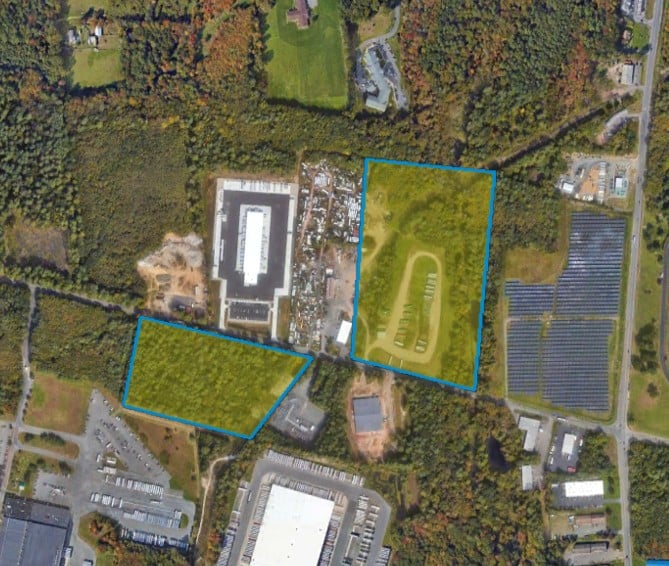The current proposed site of the Streamfield Energy System’s battery energy storage system that will be the subject of a public hearing by the Energy Siting Board on Tuesday, April 29, at 6:30 p.m.
Photo credit: streamfieldenergy.com
WESTFIELD — In February, the Department of Public Utilities transferred to the Energy Facilities Siting Board the requests by Jupiter Power to construct and operate two 114 kilovolt underground transmission lines, and for comprehensive zoning exemptions from the city of Westfield’s zoning laws, both in connection with the company’s proposed construction of a 200-megawatt 800 megawatt-hours battery energy storage system (BESS) in Westfield known as Streamfield Energy Storage. A description of the project is on the website at streamfieldenergy.com in English, Spanish, Ukrainian and Russian.
Briefly, Jupiter Power proposes to construct a 200 MW/800 MWh battery energy storage system, including two underground transmission lines and two project substations, on approximately 34.9 acres of land on Medeiros Way in Westfield. The two proposed transmission lines are approximately 1,800 feet and 600 feet long, respectively, and would connect the BESS with the Buck Pond Substation, also located on Medeiros Way. The project would use lithium-ion batteries housed in approximately 219 above-ground enclosures.
The BESS would charge with power from the electric grid during periods when there is excess energy and deliver power back onto the electric grid during times when there is a higher need for electricity.
The Energy Facilities Siting Board will now review the company’s zoning petition in conjunction with a review of the petition for the related 115 kV underground transmission lines in a single consolidated docket, EFSB 25-04/D.P.U. 24-151. The Siting Board is providing additional opportunity to comment on the project, with one virtual public comment hearing and two additional opportunities for written comments.
The Siting Board will conduct its virtual public comment hearing on Tuesday, April 29, at 6:30 p.m.
Attendees may join by clicking on the following link: us06web.zoom.us/j/84632716786. For audio-only participation, attendees can dial in at 646-558-8656 — not a toll-free number — and then enter the Webinar ID: 846-3271-6786.
To provide oral comments during the virtual public comment hearing, send an email to Yonathan.Mengesha@mass.gov with the commenter’s name, email address and mailing address by noon, April 29. To provide comments by telephone, leave a voicemail message referencing “EFSB 25-04/D.P.U. 24-151” at 617-305-3544 with the commenter’s name, telephone number and mailing address by noon Monday, April 28, 2025. Pre-registered commenters will speak first, and other commenters afterward.
The Siting Board also invites written comments on the project, preferably by Tuesday, May 13.
At the virtual public comment hearing, Jupiter Power a.k.a. Streamfield Energy will present an overview of the project. Public officials and members of the public will have an opportunity to ask questions and make comments, and the hearing will be transcribed by a court reporter. A recording of the virtual public comment hearing will be posted to the Siting Board’s YouTube channel after the hearing, at tinyurl.com/5h3w7nme.
The Siting Board will review the project to determine first whether the project is necessary, serves the public convenience, and is consistent with the public interest under G.L. c. 164, § 72; and second, whether the zoning exemptions should be granted, and if the proposed use of the project site is reasonably necessary for the convenience or welfare of the public, pursuant to G.L. c. 40A, § 3.
Written comments on the Project must be filed in two places:
First, comments must be filed with the Siting Board in electronic format, by email or email attachment, to dpu.efiling@mass.gov and to donna.sharkey@mass.gov no later than the close of business on Tuesday, May 13, 2025. The text of the e-mail must specify the docket number of the proceeding (EFSB 25-04/D.P.U. 24-151); the name of the person or entity submitting the filing, and a brief description of the document. The electronic filing should also include the name, title, and telephone number of a person to contact in the event of questions about the filing.
Second, the comments must be sent electronically to counsel for the Company: Shane Early, Sheppard, Mullin, Richter & Hampton LLP, 2099 Pennsylvania Ave, NW, Washington, DC 20006, searly@sheppardmullin.com.
The previous record from the Department of Public Utilities, including comments from the public comment hearing and discovery will be considered and reviewed by the Siting Board. All parties and limited participants from the department proceeding will automatically retain the same status in the Siting Board proceeding.
Intervenors in the deliberations that were approved through the timely filing of petitions, include the city of Westfield, Westfield Residents Advocating for Themselves Inc., and NSTAR Electric Company d/b/a Eversource Energy.
In addition, the DPU received timely petitions for limited participation from two Westfield residents, City Councilor Karen Fanion and Mary Ann Babinski, and from Westfield Gas and Electric — Whip City Fiber.
Babinski, a former Ward 1 city councilor, formerly a member of the Barnes Aquifer Protection Advisory Committee and the Barnes Air National Guard Base’s Restoration Advisory Board, said she has participated in nearly all of the public hearings for the proposed Jupiter Power project to date.
She said the project site now being proposed for Streamfield Energy is overlapping the aquifer. “We have a contaminated aquifer. For any kind of development over the aquifer, the risk far outweighs the benefit — since we’re fighting and still dealing with the cleanup of the aquifer.”
Babinski said the city has spent tens of millions to filter the water, but it hasn’t been cleaned up. She referred to a week of workshops about PFAS that she attended at the University of Massachusetts Amherst a couple of years ago. “Seven days of seminars — people thought they had solutions, but all we could do is filter at that point.”
“This whole investigation by the National Guard — where is the plume, can it be cleaned up — when they are still studying this, to me it makes no sense. The risk far outweighs the benefit, what we’re experiencing now that’s being studied, why put something else in place that could pose a risk,” Babinski said, adding, “My big concerns are all that we have been going through with the aquifer already.”
On Dec. 19, the Westfield City Council voted unanimously in support of a resolution opposing a lithium battery energy storage facility on Medeiros Way in the city’s Water Resource Protection District. The mayor, Planning Board, and Southampton Planning Board and Select Board together have written letters to the DPU opposing the project, which are part of the record, along with many letters and comments from individuals.
An ordinance amendment proposed by Westfield Councilor Nicholas Morganelli to strengthen the city’s zoning ordinances to include a definition of battery energy storage systems, restrict where they may be located in the city, and to prohibit them in the Water Resource Protection District, is now being reviewed by the Zoning, Planning and Development committee.
Electronic copies of the petition and attachments for the proposed BESS project have been provided to the Westfield City Clerk.
Hard copies of the petitions, including all attachments, are available for public inspection at the Westfield City Clerk’s office, Room 210, City Hall, 59 Court St; the Westfield Athenaeum, 6 Elm St., and at the Energy Facilities Siting Board, One South Station, 3rd floor, Boston, MA 02110.
For periodic updates, visit the Siting Board’s webpage for this proceeding at tinyurl.com/59zyrkda.


